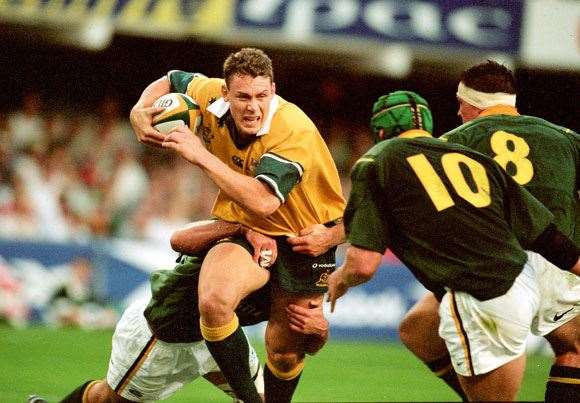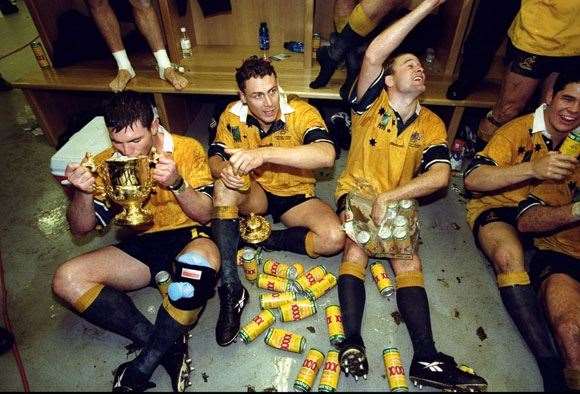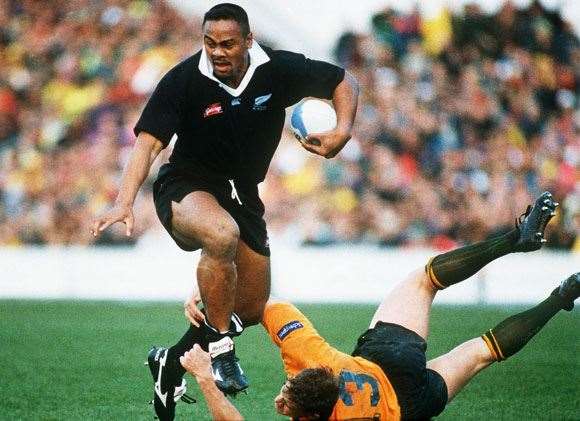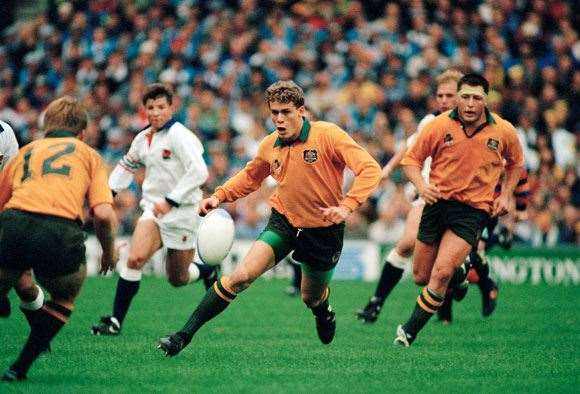He was a fabulous sight in full flight and used his speed and anticipation to score 21 tries. Inside Sport caught up with him to investigate the secrets of his success ‒ at work and play.
He was a fabulous sight in full flight and used his speed and anticipation to score 21 tries. Inside Sport caught up with him to investigate the secrets of his success ‒ at work and play.
 One half of the once-lethal Jason Little -Tim Horan centre combo.
One half of the once-lethal Jason Little -Tim Horan centre combo.Images: Getty Images
Mick Farr-Jones apparently predicted that Jason Little’s team-mates would one day be parking their battered VWs in the circular driveway of Little’s estate for Wallaby reunions. And he was pretty close to the mark: these days you’re more likely to read about Little’s latest exploits in BRW than a sports magazine. As the Country Manager at Goodman, one of Australia’s biggest industrial property developers, Jason Little has gone from world-beating outside centre to day-to-day responsibility for $8.8 billion of property and assets, heading up the overall operations of the Australian business. Back in the day, though, Little played 79 Tests between 1989 and 2000, most outside his great mate from their teens, Tim Horan, forming what was widely acknowledged as the best centre pairing in the world – and collecting World Cups in 1991 and ’99 to prove it, plus various famous Bledisloes. He was a fabulous sight in full flight and used his speed and anticipation to score 21 tries. Inside Sport caught up with him to investigate the secrets of his success ‒ at work and play.
How would you approach the task of tackling Sonny Bill Williams?
He’s been phenomenal, hasn’t he? He has an amazing ability to offload the ball in traffic, and that is a rare, rare skill. He creates so much room for others around him, so trying to contain him would be a real handful. It would have been interesting if he’d gone straight to New Zealand when he first went to rugby; I think France might have slowed his progress.
Who’s the toughest player you ever had to handle? I’m guessing his first name was Jonah and second name was Lomu ...
I remember running out for a Test at Sydney at the Football Stadium and Ian Jones, their second-rower, ran out – and he was a big man. And then Jonah, this winger, ran out after him and he was almost the same height, but thick and fast. Just when you thought you had him, you were actually kidding yourself. It was sad that he had the kidney disease. He was brilliant.
You always struck me as of the same kind of playing temperament as someone like John Eales – very hard to rile, and it would have to be a good reason for you to ever lose it.
Well, I don’t think I was ever sinbinned or sent off in 30 years of playing football.
 The Wallabies’ 1999 World Cup celebrations were anything but little ...
The Wallabies’ 1999 World Cup celebrations were anything but little ...Images: Getty Images
Do you remember ever getting into a fight on the football paddock?
Yes. Though, I probably only ever threw one, maybe two punches in my whole life. I was playing a club game in Brisbane against Wests and they had this 70-kilo openside flanker who was the skinniest little kid ever, and for some reason I went over and threw a punch at him, and he knocked me out. I was gone! After that I decided it wasn’t a good space for me to be in, throwing punches.
Tell me about your professional life since you left the game. Are we talking the old boys’ rugby network, or do you have a natural talent for brokering billion-dollar property deals?
Well, when I was playing, even professionally, I was working on any day off. I studied. I had a cadetship. Then after I finished I worked for a small investment bank. And I’ve been here at Goodman for eight years. Regarding that rugby network, it can be a benefit, but it can also be of detriment to you. There’s probably more focus on your performance than anyone else. The spotlight is on you. But I always found that when I was playing, if I was also working or studying, for some reason I seemed to play better football. I don’t know whether that was because I was better balanced in life or had a broader outlook on things, or whether it was just an escape away from rugby, but I definitely noticed it.
How’s the work-life balance these days?
I do enjoy my work and its responsibilities, but the balance side is tough – you’ve got to have a good family life, a good work life, and something else stimulating you ... I turned 40 last year, and the injuries start to kick in a bit, so you try to find alternative exercise – for my birthday I got a mountain bike and a Malibu surfboard ...
Someone trying to give you the hint there?
Exactly. They were both from my wife.
We didn’t see you Wallabies getting into any sort of trouble back in the 1990s. Were there just lots of well-kept secrets? Or was that the Bob Dwyer effect? He had you going to art galleries and the theatre on tour, didn’t he?
Bob was great like that. He had a good switch between enjoying the country you were in and also knowing when to train and switch on – he had a good balance on things. Also the fact is that when we played you didn’t have the money to get into trouble.
 Even Jason Little was reduced to “speed hump” status against Jonah Lomu. Images: Getty Images
Even Jason Little was reduced to “speed hump” status against Jonah Lomu. Images: Getty ImagesYou were enticed by rugby league at one stage, weren’t you?
I was. But I have a real love of rugby as a sport and the culture that goes with it. You get to travel and see the world and you get to meet some interesting people, whether they’re co-players or supporters or whatever. People ask me what the highlight of my career was: it was actually going to Villers-Bretonneux on the Western Front in France. People expect you to say winning the World Cup or something like that. But that was amazing. I only have one photo from 20 years of rugby in my whole house and that’s of me and the manager of the team walking down one of the memorials with all the crosses off to the side.
Who’s the best coach you ever played under?
I thought Bob Dwyer really understood the game, how it was played and how it evolved. Rod Macqueen was definitely the most organised – had great procedures, great protocols, created a great culture and had good people who understood the game under him, so it was different, but both were very effective.
Have you drawn on Rod Macqueen’s example in your own managerial life?
Very definitely. Even though we were professionals for three years before Rod took over, he actually introduced professionalism to Australian rugby and approached it in a whole new and different way. He provided a real discipline that had been lacking.
Your career broached the amateur-to- professional transition in the game. Did the game lose anything with that change? Did players stop having as much fun?
Not necessarily. I don’t think the game or the enjoyment changed at all; to me the money wasn’t irrelevant, but it wasn’t the main priority. I think
the only thing that I didn’t enjoy was that you were going into a camp with Rod and the team and you basically lived in a hotel for a long period of time and there was a lot of really narrow focus. That was good for the team, but it was a bit “groundhog day”.
Are you involved with rugby at all these days?
I’m on the board of the Rugby Union Players’ Association. That’s my real first commitment back to the game on a formal basis. I’m enjoying that.
What are the hot issues there?
At the moment it’s the negotiation of the collective bargaining agreement with the ARU.
 A loose ball retrieved at Twickers in ‘91.
A loose ball retrieved at Twickers in ‘91.Images: Getty Images
So that would seat you opposite Aussie rugby supremo John O’Neill?
Not me personally, but I guess the issues coming through do. I think the Rugby Union Players’ Association is having a lot more considered and conciliatory approach to the agreement than it had previously, so I think there’ll be a good result for everyone.
The players would have to appreciate that rugby union hasn’t kept growing the way it looked like it was headed six or seven years ago ...
I think in 2003, with the rugby union World Cup in Australia, it was probably at its peak in revenue and support, but it’s really floundered post that.
Do you put that down to the lack of Wallaby success, or is it problems with the game itself? You’d know there’s been a lot of frustration from even the most hardcore fans about the game’s rule interpretations ...
Well, I have to agree with you there. And I was one of those as well. I would cringe sometimes going out to watch a game because it just wasn’t
an enjoyable experience.
I grew up with the feeling that watching the Wallabies run on to a paddock was the greatest sight in sport, but I have to admit I’ve struggled in recent years to get excited ...
Exactly. I think the lowlight was not selling out the Bledisloe last year – previously you could sell it out 50 times over.
Things seem brighter this season with the rule tweaks in Super 15. It seems the change in interpretation of the rules is allowing for a better spectacle ...
A more fluent, open game – definitely. I think the big challenge for Australian rugby is the influence it can have on the International Rugby Board. We are the most competitive sporting market there is. We need to move faster than the IRB to allow the game to continue to flourish and grow in Australia. That’s the big challenge.
How great would it be if our whole country followed just one code?
It would be amazing. You see it through the kids – they go and play a rugby game on Saturday morning, and you see some phenomenally good kids, and then you go to a league game, and you see some of the talent there ... You think, “God, if these merged, it would be amazing.”
Can you can sit down and watch an Aussie rules match from go to whoah?
I can. And English soccer. For me it’s about appreciating amazing athletes. Just the skills some of these people have.
Rugby league?
Yeah, definitely. I love watching the Wests Tigers – Benji Marshall. I used to love watching the Cowboys when they were at their best, throwing the ball around – anyone who has some skills and shows some enterprise.
Tim Horan would want me to ask you this question. Who’s the best inside centre you ever played outside?
Well, I didn’t play outside too many, so that’s a pretty easy question. To put it the other way, if Jonah was the hardest to play against, the best guy to play with was Tim: hard, mentally very tough – the harder the game got the better he played. You’d watch him play a club game – yeah, he’s good. Watch him play for Queensland – yeah, that’s pretty good. Watch him play a World Cup final or semi-final and he was phenomenally good. Mentally, he was able to lift himself. When I was partnering Tim we got called the world’s best centre combination – that was pretty good. Then I got dropped and Dan Herbert came in and they were the world’s best centre pair combination. I think you could have put a prop like Richard Harry outside him and they would have been the world’s best centre combination.
Have you got one Tim Horan story for us that hasn’t seen the light of day that you know would embarrass him?
I’d be walking into something there. He’s got a microphone now and always seems to have the last word.
He was a funny bloke to have around, wasn’t he?
He was. Practical jokes were his thing – distractive relief, I think you might have called it. That kind of thing binds a team together.
 Jason Little Portrait
Jason Little PortraitImages: Getty Images
I have a photographer mate, Mike Larder, who travelled with you and Tim when you toured country Queensland with the Bill trophy after your win in ‘91. He reckons I should ask you how much panelbeating needed to be done to the trophy after you brought it back?
I don’t think it was repairs. I can’t remember where we were, Goondiwindi I think – we’d go to a country town and meet with the rugby community, and that always revolved around a pub of some kind, and I think we got 20 kays out of town and realised that we’d left the World Cup on the bar and had to go back and get it! My Mum and Dad lived at Jimbour, a little country town just out of Dalby, and I remember having breakfast at their pig farm with the World Cup sitting on the table. Jimbour had about ten people in it. Then when we won in ’99 we did the same trip and this time we had the security guard – you weren’t allowed to touch it. The guard had a gun and you couldn’t get it out of the box. Things have changed.
You enjoying this year’s Super 15? It’s been a step up, hasn’t it?
Yep. It has. The Reds have been great, the Waratahs have generally been pretty good, the Rebels and Force have had some surprise good and bad games, so if they can keep that momentum it’ll hold them in good stead for later in the year.
Do you reckon they’re playing better or have they finally got the rules sorted?
I don’t know if they’ve got the rules sorted – the interpretation of some of the rules has been good. But when you bring a Northern Hemisphere referee down and play under the same rules it can be a debacle. Southern Hemisphere referees and how they administer the game has got better than it is in other countries. It’s a different mindset over there, even among the supporters: 90,000 people will come away from a 6-3 game and think it’s wonderful. The last World Cup in France was the worst. It was terrible. Even after Australia got knocked out, the other semi-finals and final were excruciating to watch.
Who’s impressed you in the Australian Super rugby ranks?
I’m a big fan of Kurtley Beale’s, big fan of Quade Cooper’s, Adam Ashley-Copper, Berrick Barnes, James O’Connor – there’s some really, really good players across a number of positions.
So what does your Wallaby backline look like?
Will Genia, Quade Cooper, I’d have Berrick Barnes there because he gives Quade Cooper a bit of direction. To me Quade can be a bit ... loose.
Flamboyant? Campese-esque?
Yeah, definitely. Berrick Barnes balances that very nicely. Adam Ashley-Cooper at outside, Kurtley Beale at fullback, James O’Connor on one wing and Drew Mitchell on the other if he is fit. You’ve got all those guys in great form ...
It’s a small backline though, isn’t it?
It is, but you’ve got Adam Ashley-Cooper – gee, he’s strong. And I think his performance against those massive French centres last year showed he’s up to it. But I agree that’s the only issue – Digby Ioane as well, you’ve got to have him in there somewhere, just for that same reason. I think you’ve got enough size in there then. And you’re always going to get an injury. If you’ve then got Matt Giteau coming off the bench, 25 to 30 minutes to go, he could cause some real damage. And finally we’ve got some guys who can really kick goals, which has let us down in previous years. Same guys, but they’ve knuckled down and got it going.
So whose going to win this year's World Cup?
Interesting, isn’t it? New Zealand at home is going to be very formidable. I mean, the only other time they’ve won it is when they hosted it. They would say the pressure’s going to be high for them, especially at home, but I think it’ll be a help and not a hindrance.
They’re going to have a hard time positioning themselves as underdogs this time around, aren’t they?
Yeah, very true – they always have. They just have to get over that mental hurdle of being bombed out of World Cups. It’s delicious to think how annoyed the Kiwis will be if Robbie Deans steers the Wallabies to the title, isn’t it?I look at that guy and all our team as very young. At the next World Cup they’ll be at their absolute prime. What I’d hate to see is Robbie leave and go back to New Zealand when you know we’re going to get so much better. But yeah, it would be wonderful to see.
Are we good enough to get to the final?
Oh definitely. A year ago I wouldn’t have said that, but I think our scrum has really improved. For the first time in the history of Super rugby we’ve got Australian teams dominating in the scrum. We got a pushover try in New Zealand, which has never been heard of. Even the Reds’ forward pack dominated the Stormers in South Africa – we’ve never seen this before. And it’s fantastic. Our challenge is that referees have the preconceived thought in their heads that the Australian scrum isn’t strong, so when a scrum goes down it’s automatically against us. That has to change and I think it will change. I think we’ve been unfairly treated in the scrums the last couple of years.
I take it you’re going to be over there ...
Yes, I’m going over on a Cruiseco ship for a week, for semi-finals and finals. Plus we do a circumnavigation of the north island in that week ‒ I’ve never seen any of New Zealand except from hotel rooms and rugby stadiums.
Footnote: Jason Little is a Cruiseco ambassador.
‒ Graem Sims
Related Articles

Socceroos midfielder embraces move to England

Cardiff City snap up sought-after Socceroos starlet













